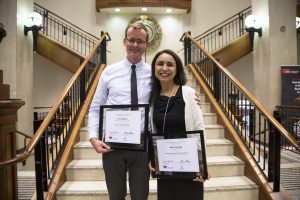Wearable tech and carbon capture companies win SFU science and tech start-up competition
Oct 12, 2017

Bart de Baere, Flow-Through Solutions, and Bahar Motlagh, FlexiPatchR, the winners of the second annual “Invention to Innovation” venture pitch competition.
Start-up companies FlexiPatchR, which makes wearable technology to monitor Parkinson’s disease symptoms, and Flow-Through Solutions, which helps mining companies capture CO2 emissions, were the winners in their respective categories at the second annual “Invention to Innovation” venture pitch competition.
The event, which took place on October 11, 2017, brought together six scientist-entrepreneurship students in the second cohort of the i2I program at SFU’s Beedie School of Business. This Graduate Certificate in Science and Technology Commercialization program equips scientists and engineers with the business skills required to make their inventions a commercial success.
The competitors pitched their ventures to a distinguished panel of judges, all of whom have extensive experience in angel and seed investment and mentorship for science-based ventures. FlexiPatchR was competing in the ‘Emergent Venture’ category, for earlier-stage companies, while Flow-Through Solutions won the ‘Product Ready Venture’ competition, for more developed businesses.
Bahar Motlagh delivered a three-minute elevator pitch on her company, FlexiPatchR, which combines unique sensor technology and software to create an easy-to-use wearable sensor to monitor Parkinson’s disease symptoms. Information on the patient’s symptoms is uploaded to the cloud, where it can be accessed by clinicians to help inform delivery of the correct medication and dosage.
Flow-Through Solutions was represented by co-founder Bart de Baere, who gave a 10-minute investor presentation and answered questions on the concept. The company provides mining corporations with unique tools and expertise to help lock CO2 in mine waste, reducing environmental impact and delivering savings to mining companies through reduced carbon tax liabilities.
“I feel truly honored to have delivered the winning pitch in the product-ready venture category at this year’s i2I venture pitch competition,” says de Baere.
“Delivering a convincing 10-min pitch feels fantastic, but I would like to share this recognition with all of the 2016-2017 i2I cohort. One of the unique characteristics of the i2I program is that it brings together scientists from a wide range of disciplines who work as a team to help articulate their innovation idea to a non-scientific audience. I couldn’t have done this without their support and feedback. Finally, I’d like to thank Elicia Maine for spearheading this unique program at the Beedie School of Business – graduate programs such as i2I help inspire, educate, and prepare the next generation of Canadian scientist-entrepreneurs.”
“It was wonderful to have three cohorts of the i2I program mingling tonight with each other, and with the judges, mentors and professors,” says Elicia Maine, academic director of the i2I program.
“The 2015 cohort is already impacting the BC innovation ecosystem in a variety of ways, ranging from commercializing an invention through their own venture, to product development and business development roles in local SMEs, to knowledge translation roles. The 2016 cohort–who convocated last week–did themselves proud, pitching their nascent business models for turning their inventions into innovations. And the 2017 cohort, one month into their program, will have been shaping their innovation ideas based on the feedback the judges provided tonight.”
The other finalists pitching their innovation ideas in the competition, and their ventures, were:
Emergent Ventures
- Nathanael Sieb, 4D Labs
4D LABS primarily helps early-stage advanced materials companies get products to market faster and more efficiently by offering the most capable research facility for developing prototypes and testing devices; and - Rasoul Narimani, Spurious Correlations
A predictive analytics tool for anticipating demands on emergency rooms. The product monitors external data, such as posts from social media and weather forecasts, to predict how many patients will arrive at ERs, at what time, and at which hospital.
Product Ready Ventures
- Laura Guzman, Hydra Energy Corporation
Hydra Energy Corporation has developed a product that can power heavy duty internal combustion engine semi trucks with waste hydrogen; and - Austin Lee, MolecularCoat
MolecularCoat’s first product, CellStick™, is a coating formulation for cell biologists to improve cell viability and growth on glass microscope slides and petri dishes.
The judges asked extensive questions of the scientist-entrepreneurs, challenging them on their business models, value proposition and competitive positioning. The member of the panel were:
- Charles Chang, President & Founder of Lyra Growth Partners;
- Geof Auchinleck, Founder and CEO of Claris Healthcare;
- Paul Terry, CEO of PHEMI Health Systems;
- Christopher Bissonette, Managing Partner of Pallasite Ventures Inc; and
- Sonia Ziesche, Patent Agent at Gowling WLG Canada.
